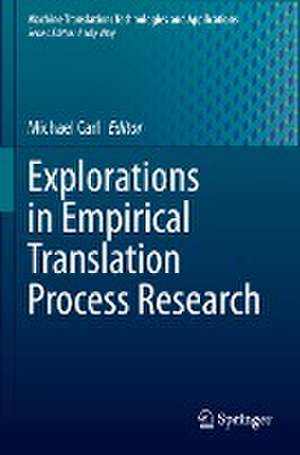Explorations in Empirical Translation Process Research: Machine Translation: Technologies and Applications, cartea 3
Editat de Michael Carlen Limba Engleză Paperback – 29 iul 2022
The volume addresses questions in the translation of cognates, neologisms, metaphors, and idioms, as well as figurative and cultural specific expressions. It re-assesses the notion of translation universals and translation literality, elaborates on the definition of translation units and syntactic equivalence, and investigates the impact of translation ambiguity and translation entropy. The results and findings are interpreted in the context of psycho-linguistic models of bilingualism and re-frame empirical translation process research within the context of modern dynamic cognitive theories of the mind. The volume bridges the gap between translation process research and machine translation research. It appeals to students and researchers in the fields.
| Toate formatele și edițiile | Preț | Express |
|---|---|---|
| Paperback (1) | 897.47 lei 6-8 săpt. | |
| Springer International Publishing – 29 iul 2022 | 897.47 lei 6-8 săpt. | |
| Hardback (1) | 1012.53 lei 6-8 săpt. | |
| Springer International Publishing – 28 iul 2021 | 1012.53 lei 6-8 săpt. |
Preț: 897.47 lei
Preț vechi: 1094.47 lei
-18% Nou
Puncte Express: 1346
Preț estimativ în valută:
171.78€ • 186.66$ • 144.39£
171.78€ • 186.66$ • 144.39£
Carte tipărită la comandă
Livrare economică 21 aprilie-05 mai
Preluare comenzi: 021 569.72.76
Specificații
ISBN-13: 9783030697792
ISBN-10: 3030697797
Ilustrații: XXXIX, 412 p. 119 illus., 82 illus. in color.
Dimensiuni: 155 x 235 mm
Greutate: 0.63 kg
Ediția:1st ed. 2021
Editura: Springer International Publishing
Colecția Springer
Seria Machine Translation: Technologies and Applications
Locul publicării:Cham, Switzerland
ISBN-10: 3030697797
Ilustrații: XXXIX, 412 p. 119 illus., 82 illus. in color.
Dimensiuni: 155 x 235 mm
Greutate: 0.63 kg
Ediția:1st ed. 2021
Editura: Springer International Publishing
Colecția Springer
Seria Machine Translation: Technologies and Applications
Locul publicării:Cham, Switzerland
Cuprins
Introduction.- Part 1: Translation segmentation and translation difficulty.- 1. Micro Units and the First Translational Response Universal.- 2. Metrics of syntactic equivalence to assess translation difficulty.- 3. Entropy and eye movement: A micro analysis of information processing in activity units during the translation process.- 4. Translating Chinese Neologisms without Knowledge of Context: An Exploratory Analysis of an Eye-tracking and Key-logging Experiment.- 5. Translation Norms, Translation Behavior, and Continuous Vector Space Models.- Part 2:Translation and entropy.- 6. Information and Entropy Measures of Rendered Literal Translation.- 7. redBird: Rendering Entropy Data and source-text Background Information into a Rich Discourse on Translation.- 8. Using a product metric to identify differential cognitive effort in translation from Japanese to English and Spanish.- 9. Analysing the effects of lexical cognates on translationproperties: a multi-variate product and process based approach.- Part 3: Translation Technology, Quality and Effort.- 10. Editing actions: a missing link between Translation Process Research and Machine Translation Research.- 11. Word-level HTER edits as indicators of cognitive effort in post-editing.- 12. What do you say? Comparison of temporal, technical and cognitive dimension measurements for post-editing effort.- 13. Measuring effort in subprocesses of subtitling: The case of post-editing via pivot language.- 14. Translating science fiction in a CAT tool: post-editing effort and text segmentation.- 15. Ecological-enactive approach to translation.
Notă biografică
Michael Carl is a Professor at Kent State University/USA and Director of the Center for Research and Innovation in Translation and Translation Technology (CRITT). He has published widely in the fields on machine translation, natural language processing and cognitive translation studies. His current research interest is related to the investigation of human translation processes and interactive machine translation.
Textul de pe ultima copertă
This book assembles fifteen original, interdisciplinary research chapters that explore methodological and conceptual considerations as well as user and usage studies to elucidate the relation between the translation product and translation/post-editing processes. It introduces numerous innovative empirical/data-driven measures as well as novel classification schemes and taxonomies to investigate and quantify the relation between translation quality and translation effort in from-scratch translation, machine translation post-editing and computer-assisted audiovisual translation.
The volume addresses questions in the translation of cognates, neologisms, metaphors, and idioms, as well as figurative and cultural specific expressions. It re-assesses the notion of translation universals and translation literality, elaborates on the definition of translation units and syntactic equivalence, and investigates the impact of translation ambiguity and translation entropy. The results and findings are interpreted in the context of psycho-linguistic models of bilingualism and re-frame empirical translation process research within the context of modern dynamic cognitive theories of the mind. The volume bridges the gap between translation process research and machine translation research. It appeals to students and researchers in the fields.
The volume addresses questions in the translation of cognates, neologisms, metaphors, and idioms, as well as figurative and cultural specific expressions. It re-assesses the notion of translation universals and translation literality, elaborates on the definition of translation units and syntactic equivalence, and investigates the impact of translation ambiguity and translation entropy. The results and findings are interpreted in the context of psycho-linguistic models of bilingualism and re-frame empirical translation process research within the context of modern dynamic cognitive theories of the mind. The volume bridges the gap between translation process research and machine translation research. It appeals to students and researchers in the fields.
Caracteristici
Presents a snapshot of recent research works in the field of empirical translation process research Explores qualitative and quantitative methods to assess translation behavior, translation effort and translation quality Analyses the relation between behavioral patterns and properties of the translation product in the light of recent psycho-linguistic and cognitive theories of the mind Extends empirical research in cognitive translation studies with novel data-driven measure and metrics




